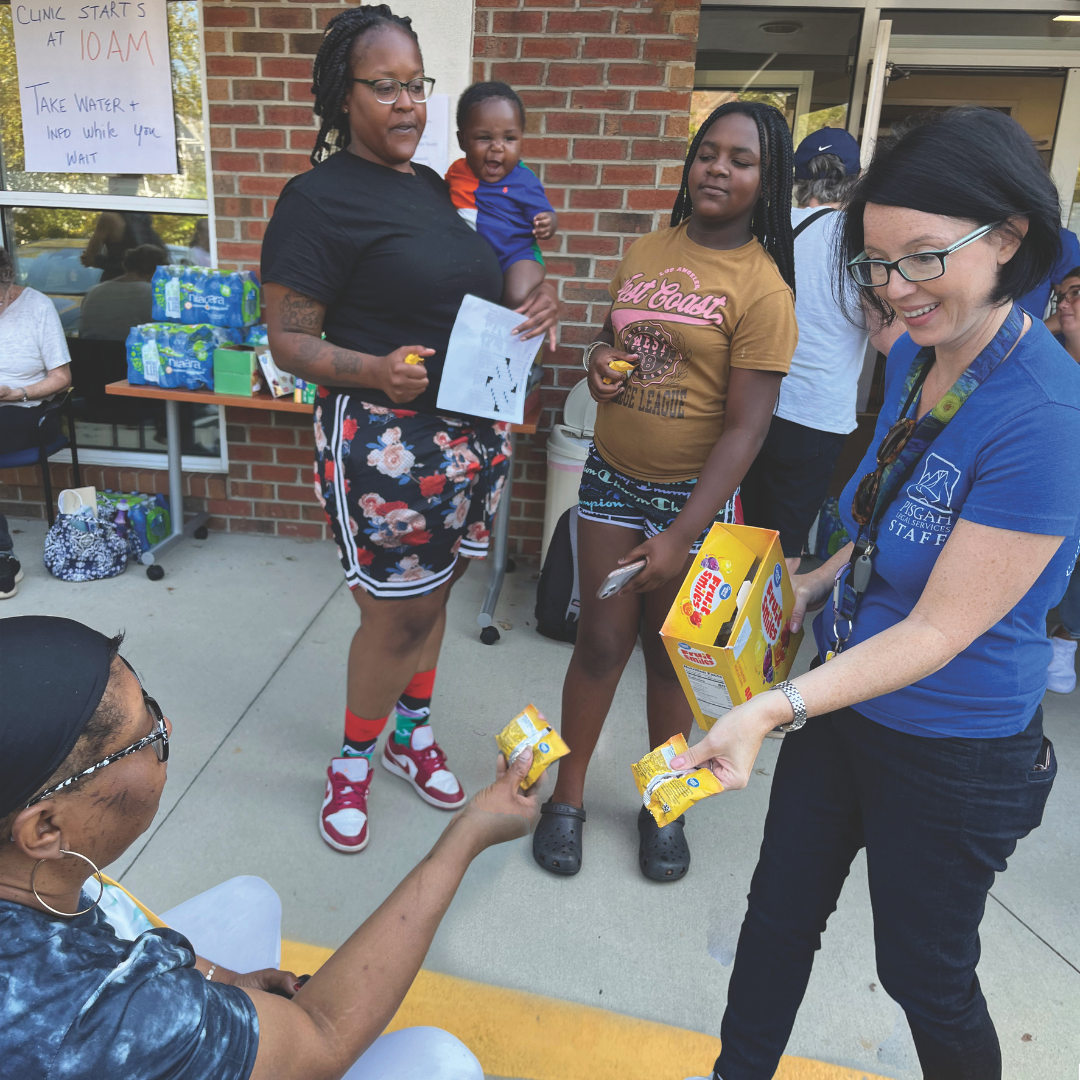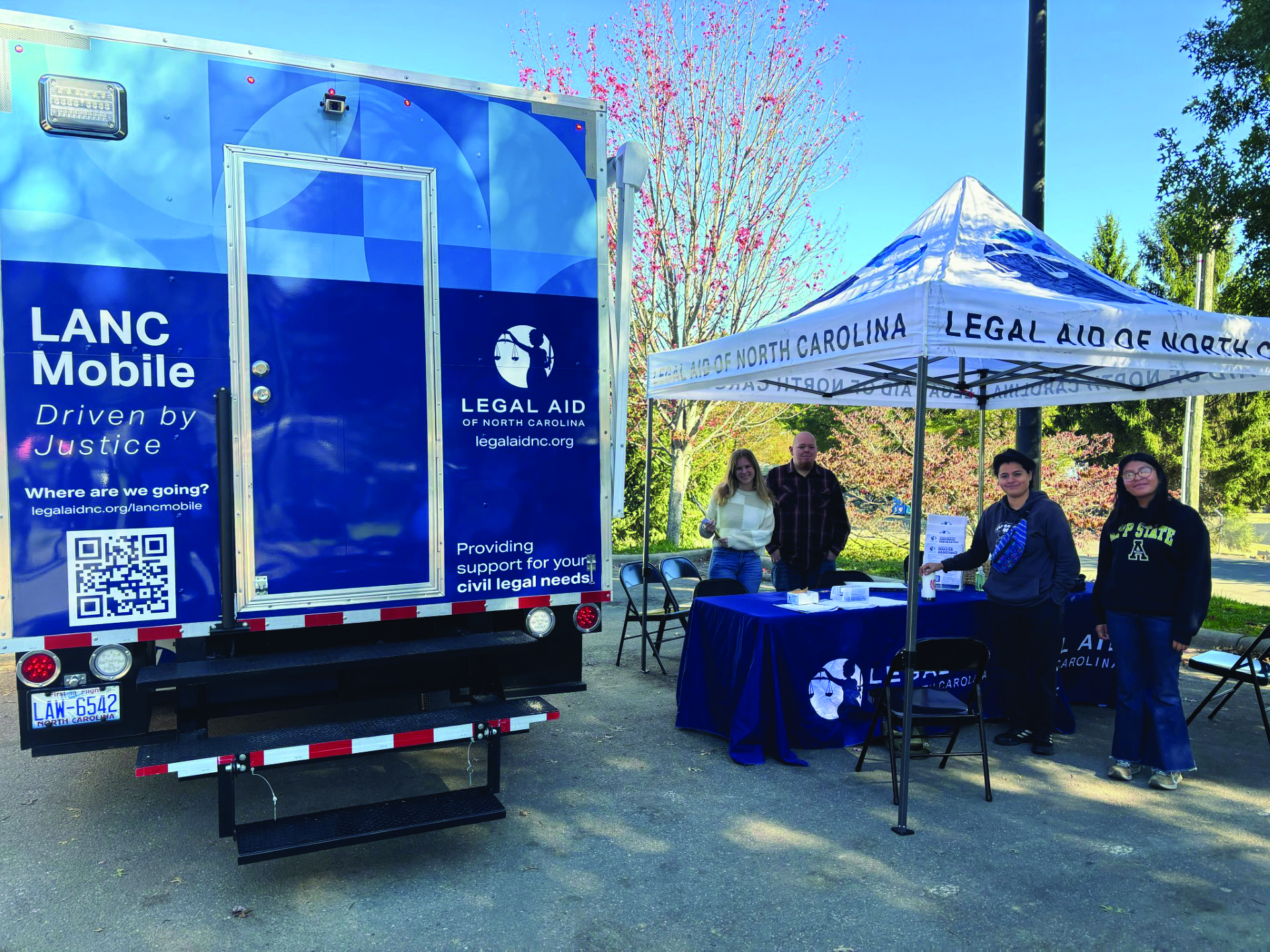Responding to Disaster: Perspectives From the Legal Services Community
Western North Carolina Is Our Home, and This Work Is Personal
Our home, Western North Carolina, bore the brunt of Hurricane Helene. Pisgah Legal Services is based in Asheville, which is located in Buncombe County, where the largest number of deaths from the storm have been reported.
It’s hard to explain in words the level of devastation not only in Asheville, but also in other WNC communities where Pisgah Legal has offices, including Burnsville and Spruce Pine; our Marshall office was completely flooded along with the rest of the town and must be rebuilt.
Several members of our staff lost or had homes severely damaged by the storm. We’ve seen our neighbors’ businesses and livelihoods destroyed, our communities literally washed away, so this recovery effort is extremely personal for us.
After the storm hit on Sept. 27, our first priority was to reach out to our staff and ensure they were safe. Thankfully, all our staff were accounted for. We quickly mobilized and held two of our first FEMA application clinics at our Asheville and Hendersonville offices on Oct. 7, even though most of the area didn’t have power or running water, including homes of our employees and volunteers.
We held two of our first FEMA application clinics at our Asheville and Hendersonville offices on Oct. 7, even though most of the area didn’t have power or running water.
In the month since, we have held clinics throughout WNC with staff and volunteer attorneys and deployed our mobile “Justice Bus,” which is equipped with much-needed Wi-Fi capability. What our clients and neighbors have survived and are still experiencing is heartbreaking, and we know this recovery will take years. Pisgah Legal Services is in this recovery for the long haul.
Number Served/How We Are Helping
As of this writing, we have held more than a dozen FEMA application clinics throughout WNC, assisting over 2,000 people. We’ve worked in partnership with nonprofits across the mountain region and in conjunction with FEMA and LANC.
Here are a few specific ways that Pisgah Legal is assisting people in WNC:
- FEMA and Disaster Benefits: Applying for FEMA assistance or other disaster relief benefits can be complicated. Our staff is assisting families with these applications to ensure they receive the help they’re entitled to. We are also assisting with appeals for qualifying families who may have been denied FEMA assistance.
- Housing and Evictions: Evictions tend to rise sharply after natural disasters and our housing team is working to stop homelessness before it happens by delaying or preventing unlawful evictions. WNC already had an affordable housing crisis, and Helene has exacerbated it.
- Know Your Rights: Pisgah Legal’s attorneys and advocates are providing resources for our WNC community members to understand their rights following a natural disaster in areas such as housing, consumer protections and benefits.
- Community Lawyering: Our pro bono staff are hosting community legal clinics with volunteer lawyers. We are partnering with grassroots organizations who have established trust and know the needs of the community best.
- Domestic Violence Prevention: Domestic violence increases in times of high stress such as a natural disaster. PLS attorneys are working to support survivors during this stressful time, including helping them navigate complicated custody issues due to relocations and lack of contact.
In addition to direct services, Pisgah Legal has shared important information on our website and social media channels. We are also serving as a resource in media interviews to reach people in our 18-county region via television, newspapers and radio, which has been particularly important for those who lost internet service for several weeks. (Some people still do not have internet, power or water, and Asheville will be without drinking water until mid-December in the best-case scenario.)
Pisgah Legal Services assists more than 23,000 people each year in WNC. Our work is made possible by generous community support as well as strong volunteer involvement. Volunteer attorneys are vital members of the Pisgah Legal team — more than 250 attorneys provide pro bono legal assistance to help Pisgah Legal’s clients each year. Now, many of those attorneys are stepping up to assist with our crucial work in connecting individuals to disaster assistance following Hurricane Helene.

Moving Forward
We stand alongside our WNC communities, and we will do everything we can to ensure that justice is served during this recovery process. With the support of the NC State Bar, we can continue to make sure that our state’s most vulnerable populations have equal access to the legal assistance they need to rebuild their lives. We are grateful to be collaborating with Legal Aid of North Carolina, as we know that the needs of Western North Carolina are great, and by working together, we can help the many people who are in need.
If you would like to volunteer or make a gift to Pisgah Legal Services’ Hurricane Recovery Fund, please visit pisgahlegal.org.
— Jaclyn “Jackie” Kiger, Executive Director of Pisgah Legal Services
After the Storm: Legal Aid’s Mission to Rebuild Communities in the Wake of Hurricane Helene
Hurricane Helene devastated Western North Carolina when it hit at the end of September 2024, and the effects will be felt for years to come. The destruction from this storm is worse than anything our state has experienced before. As of this writing, 101 people have died, and homes, businesses and even land have been destroyed or washed away. The financial estimates to recover from this storm exceed $50 billion, not to mention the emotional and physical toll it has taken on our citizens and neighbors.
Legal Aid of North Carolina is a statewide nonprofit law firm whose mission is to represent low-income individuals to ensure equal access to justice. With this mission in mind, Legal Aid has been responding to disasters and giving legal assistance to survivors for decades. The Disaster Relief Project at Legal Aid was formed in response to Hurricanes Matthew (2016) and Florence (2018) to dedicate resources to this much-needed and critical practice area. While it is true that Legal Aid represents many people in crisis through both blue and stormy skies, the aftermath of a disaster is like no other crisis handled before. A disaster affects everyone in its path — whole swaths of communities across county lines and income demographics. Beyond representing individual clients, the Disaster Relief Project represents organizational clients that want to incorporate as nonprofits so that they can serve disaster survivors, too. This allows us to make sure survivors are served holistically by creating resources in the community to cover multiple aspects of the recovery process.
Our previous experience in assisting survivors has typically been in the eastern part of our state. However, in August 2021, Tropical Storm Fred caused flooding and destruction in Western North Carolina, albeit in a much smaller area than Helene, with much of the damage concentrated in Haywood County. The complexities of responding to a disaster in a mountainous area are not new to Legal Aid. We are still representing people who were affected by Fred and who have now also been affected by Helene.
Our entire firm came together quickly after Helene hit to meet the emergent needs of the community — from updating our website and educational materials with Helene-specific information to meeting with survivors at volunteer centers, FEMA Disaster Recovery Centers and Red Cross shelters. The need is great, and there are many ways to serve the community. The Disaster Relief team has been conducting numerous training sessions — both for attorneys and community leaders. We have been updating our social media with helpful posts and organizing simultaneous Zoom and Facebook Live sessions to reach the public with information across a spectrum of legal areas. The response from the legal community to serve those in the mountains has been overwhelming, with over 1,200 legal professionals on the volunteer list!
What has struck us most is how deeply rooted the people are in their independence and strength.
Due to the unique devastation in Western NC and the inaccessibility of many communities directly after the storm, the Disaster Relief team had to rely on our local staff already in the west to meet with survivors and conduct outreach. Several days after Helene, local staff spent a week at the Mitchell County Senior Center in Bakersville. People streamed in for help — many with questions, many with specific legal needs.
We immediately saw the resilience of the Western NC people. The cleanup process was ahead of schedule by as much as a month, thanks to neighbors helping each other clear roads and driveways. What has struck us most is how deeply rooted the people are in their independence and strength. In these mountain communities, asking for help is not common. Many of the individuals we worked with in the early days had no power, no water and no idea when they would be able to return to normalcy. Yet they remained humble, gracious and, in some cases, even hesitant to accept assistance from outsiders. Despite the overwhelming need, the people in the mountains do not ask for help. They continue to rebuild, quietly and resolutely. In Yancey County, we assisted people who had lost their entire homes, with only the foundation and concrete steps remaining from where their homes once stood. Besides offering legal help, we also listened, letting people vent, cry, yell. In every community we enter, we always begin with the question, “How can we help you?” The communities know what they need; we are here to facilitate whatever positive change they seek.
Through our partnership with the Red Cross, we have staffed many of the shelters in Asheville, providing much-needed disaster legal assistance. The floodwaters in Buncombe County affected both those living in homes and those living in tents. Our clients have literally lost everything. One common legal issue was loss of all forms of identification, birth certificates, licenses and social security cards. Some clients were facing a new form of poverty, unable to apply for even basic services without a way to prove their identity. Through new working partnerships, we have spent the past two weeks working with other nonprofits and governmental agencies such as the DMV, DHHS, FEMA and Vaya Health to assist storm-affected communities.

At Legal Aid, we understand that legal needs come in waves after a disaster. Due to the extent of this storm’s damage, we are prepared to represent survivors for as long as it takes — potentially the next decade or more — as they seek to recover from Helene. Many disaster assistance groups will have to move on to help other survivors from different storms, but the legal needs will remain, as will we. The work has just begun. This is why the Disaster Relief Project was created — to provide continuous legal service related to Helene, allowing our Legal Aid colleagues to continue representing clients in “typical” Legal Aid cases, such as evictions, foreclosures, domestic violence protective orders and public benefits hearings, to name a few. Legal Aid will continue to serve the people in these communities — not as charity, but as a mission to expand access to justice, both during and after disasters.
— Alicia C. Edwards, Legal Aid’s Disaster Relief project director, and Jonathan Perry, Legal Aid’s western regional manager and managing attorney of the Foothills Office in Morganton, NC.
This story originally appeared in the Winter 2024 issue of the North Carolina State Bar Journal and has been lightly edited for style.
